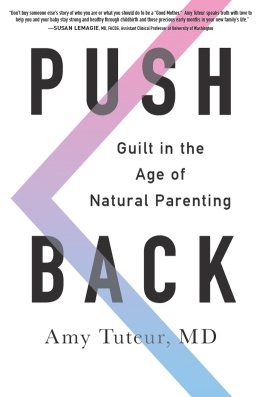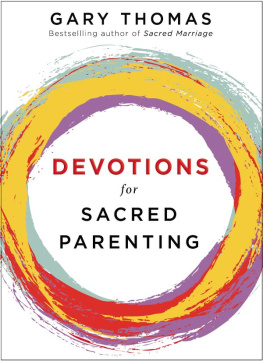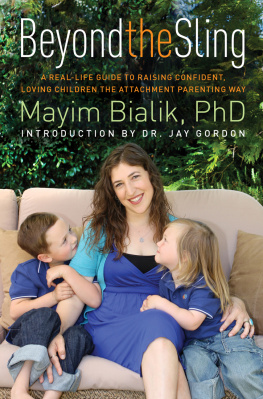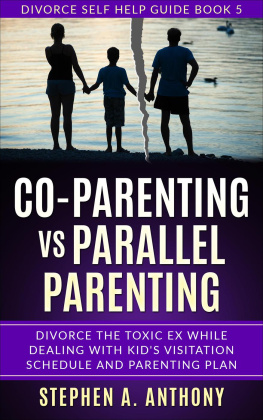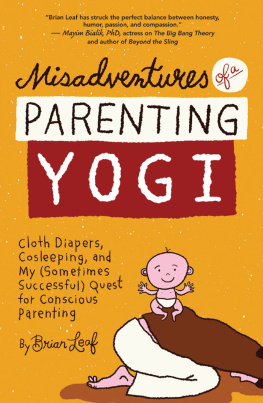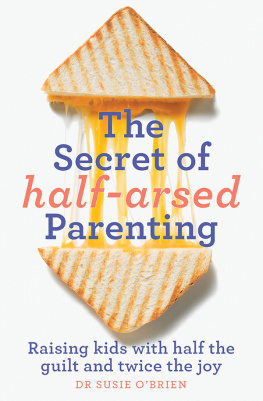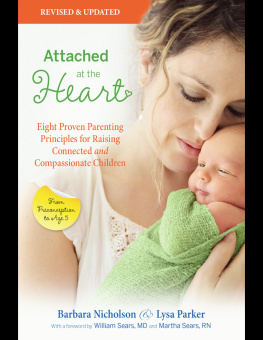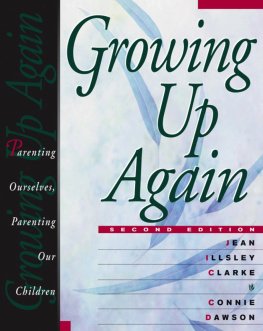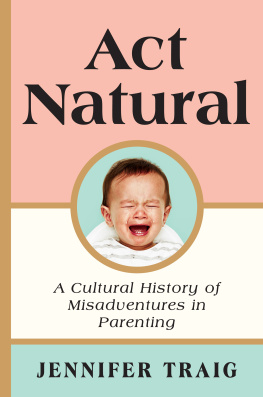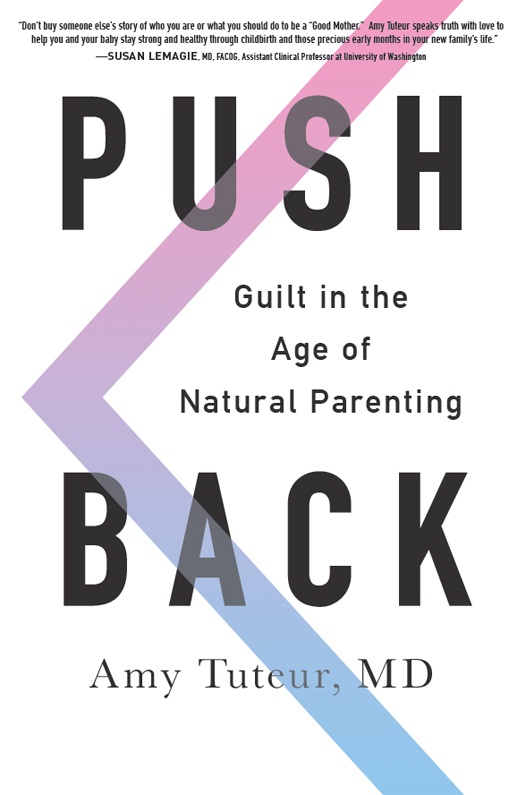For my husband, Michael.
Thirty-five years after our wedding,
I still do!
Contents
Guide
S everal hundred years ago, a famous philosopher said, Cogito, ergo sum (I think, therefore I am).
My motto is a bit different: I mother, therefore I am guilty.
If you are a mother, and chances are that if you are reading this book you are, then this may be your motto too.
My children are grown now, but I have not forgotten the pervasive feeling of guilt that parenting can engender. It has ever been thus. I cant help you with most of the guilt that comes naturally with motheringthe guilt over school choice, screen time, sibling rivalry, or discipline stylesbut there is one area in which I can offer comfort. There is no reason to feel guilty about any childbirth choices or choices of early infancy.
No woman should ever feel guilty about the choices she makes regarding childbirth, breastfeeding, or the manner in which she cares for her baby. Surprised? Unfortunately we live in a society where these fundamental aspects of a womans life are now an arena where judgment, second-guessing, and guilt reign supreme. It is no longer enough to give birth to a healthy baby and to care for that baby, providing food, warmth, and tenderness. Now all of these acts must be done, in many circles, in ways decreed correct by the natural parenting industry.
Where did this industry that dictates the behaviors of millions of women come from?
Surprisingly, the currently popular philosophies of natural childbirth, lactivism, and attachment parenting are based on nothing more than the personal beliefs of a few individuals, most of them men. To my mind, though, the most damaging aspect of this paradigm is that the judgment and guilt surrounding childbirth and child care are heaped upon women most often by other women.
I am an obstetrician and the mother of four children. When I stopped practicing obstetrics, I became a writer, focused of course on women and childbirth. Along the way I saw that there needed to be a voice of reason in the wilds of the Internet focused on mothers and childbirth. So I have spent the last twenty years becoming She Who Must Not Be Named, Enemy Number One of the Natural Parenting Industry.
Why? Because I have made it my mission to help women escape the feelings of guilt about their birth experience that trap them long after their children are born. I challenge the popular notions out there that are so often rooted in pseudoscience. I offer comfort to expectant and new mothers as they face the difficult task of caring for a newborn while simultaneously listening to a cacophony of voices telling them how to have their babies, how to feed them, how to hold them, and that if they dont follow these edicts, their babies will not thrive and become successful adults. Ive used science, common sense, and kindness to dispel what I see as the myths miring women in despair. Ive poked holes in the theories of the natural parenting proponents, and in the process Ive made some enemies, but Ive made a lot more women feel a lot better.
Push Back is my boldest statement yet, and it represents how my own thinking on this topic has evolved over the years. Initially I was simply bewildered by the ways in which my patients tormented themselves. After delivering a beautiful healthy baby to a joyous healthy mother, I would visit her the next day in the hospital and find her tearful over her failure. Instead of enjoying the miracle of her new child, she would be berating herself that she had given in and gotten an epidural for pain relief. Or perhaps she would have concluded that her C-section reflected the fact that her body was broken. There was a myriad of if-onlys. If only she hadnt agreed to the postterm induction; if only she had trusted birth more. Sometimes I wondered if the process of birth was more important than the baby itself.
When I was a practicing obstetrician, I spent a lot of time correcting the misinformation of natural childbirth advocates and comforting women whod had healthy babies but still felt guilty for not achieving a vaginal birth or a birth without pain relief. Though I was aware of the emotional response from my bedside visits, it took years of blogging about the subject, corresponding with mothers, and arguing with activists to appreciate the true depth, breadth, and prevalence of misinformation coming from the natural parenting movement, and how this has come to blight the experience of mothering infants for so many.
Twenty years ago, when I began writing on the Web, I thought that the problem could be solved with more and better information. Most of what passes for knowledge within the natural childbirth, lactivist, and natural parenting communities is flat out false. Yet simply correcting the plethora of falsehoods seemed to be fruitless. I came to understand that natural childbirth, lactivism, and attachment parenting actually are about privileging the process over the outcome.
Natural childbirth, lactivism, and attachment parenting are highly stylized, profoundly idealized representations of parenting. How do we know that they are idealized? Primarily its because the scientific evidence does not support most of their central tenets. Thats not to say that natural parenting advocates dont believe in science; they do and they invoke science a lot. However, a close examination reveals that they often subvert the scientific evidence to arrive at predetermined conclusions.
Why would anyone want to subvert the scientific evidence on childbirth, breastfeeding, and attachment parenting? Because each of these ideas has morphed into businesses, complete with trade unions, lobbying groups, and brilliant marketing. Simply put, misinformation is being promoted by birth and breastfeeding professionals, as well as parenting gurus, as a way to make money. These factions portray doctors as the enemy, and their primary product has become distrust of the medical profession. They created alternate worlds of internal legitimacy in the same way that creationists and anti-vaccine activists have done before them, complete with books, journals, conferences, and certifications to signify expertise. The Internet has been their greatest enabler, allowing women to research parenting decisions without ever leaving a massive echo chamber.
Theres far more than money at stake. Beliefs about women and their role in society undergird natural parenting. It seems to me to be more than coincidence that natural childbirth, breastfeeding, and natural parenting share a variety of disturbing characteristics. All impose an inordinate amount of work and pain on women, and all ostensibly exclude fathers and other family members, making women not merely the primary caregivers but the only acceptable caregivers a majority of the time. And by requiring intense around-the-clock effort, they make it nearly impossible for women who want or need something in addition to mothering (a job, a career, free time) to be good mothers. It all seems suspiciously like the classic ploy to control and judge women by the performance of their reproductive organs.
When I dove deeper, I was not surprised to find that most of these movements were created or promulgated by elderly white men. Advocates represent natural childbirth, lactivism, and attachment parenting as the ultimate expressions of parental love, combining scientific evidence with maternal devotion, feminism, and respect for maternal choice. The reality is far different. These philosophies that gather under the rubric of natural parenting put forth a pro-woman agenda but in fact are quite the opposite. In this book, I will show the evolution of each of the aspects of natural parentingnatural childbirth, lactivism, and attachment parentingfrom their origins to the big businesses they are today, from a search for authentic experiences to a prescribed experience that relegates women back into old-fashioned roles prescribed by gender.

